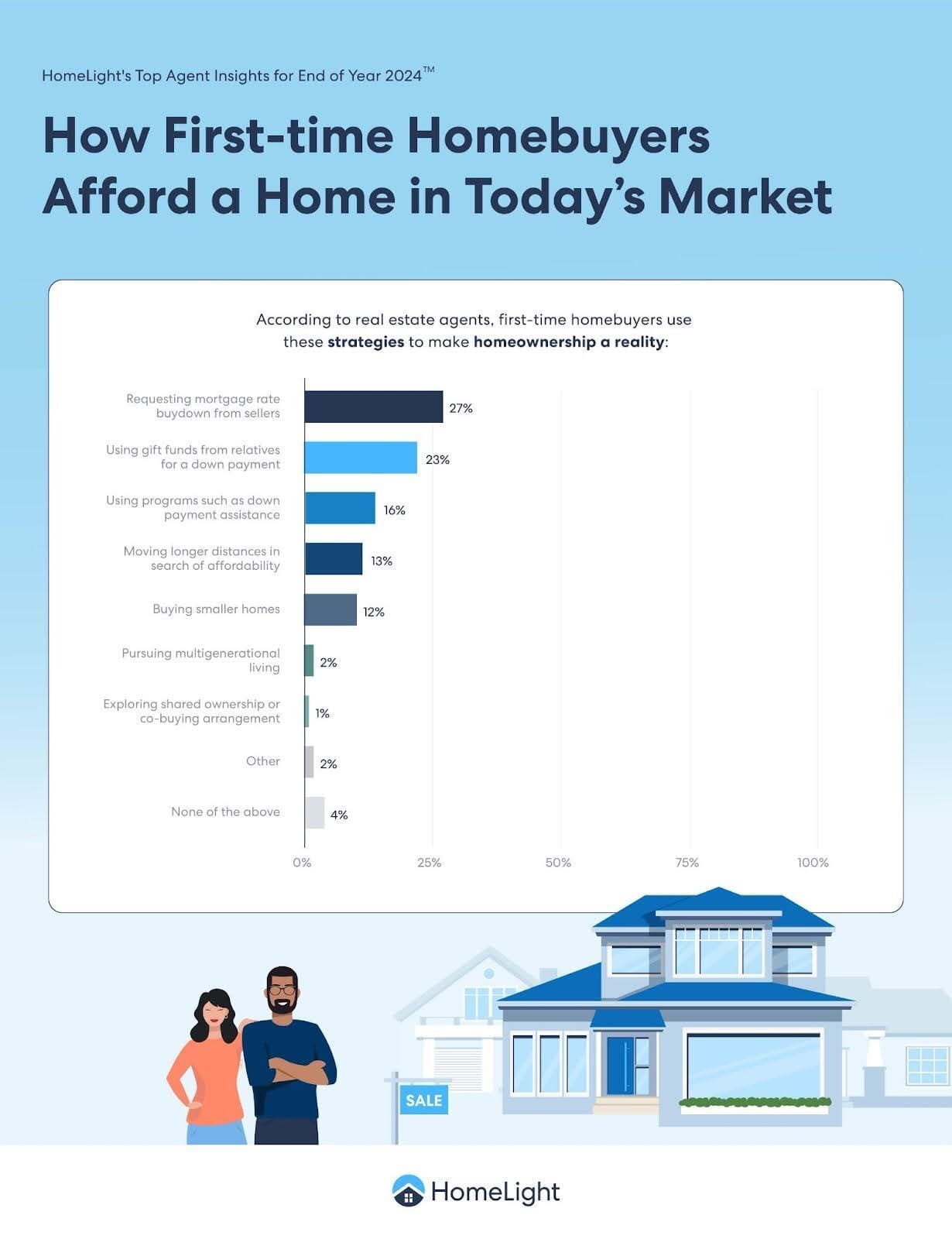How to Save to Buy a House: 21 Ideas For Stacking Up Down Payment Cash
- Published on
- 15 min read
-
Kim Upstill, Contributing AuthorCloseKim Upstill Contributing Author
Kim enjoys using her experience as an interior design consultant, picky renter and tiny home builder to help buyers and sellers deep dive into their next dream home project. Kim is currently based in Chicago IL where, when she is not going to open houses or admiring the architectural wonders of the city, she can be found at home avoiding the weather with tea and a good book.
-
Sam Dadofalza, Associate EditorCloseSam Dadofalza Associate Editor
Sam Dadofalza is an associate editor at HomeLight, where she crafts insightful stories to guide homebuyers and sellers through the intricacies of real estate transactions. She has previously contributed to digital marketing firms and online business publications, honing her skills in creating engaging and informative content.
Imagine for a moment that you open the door to a warm, beautiful home, and everything in front of you is yours — not just the furniture and knick-knacks, but also the walls, ceiling, floors, and foundation.
For many adults who are accustomed to renting the places they call home (and equally accustomed to dealing with the hassles that come with it — short-term leases, zero financial equity, and, ahem, landlords), first-time homeownership can feel like an impossible dream. They don’t teach you how to save to buy a house in school, unfortunately.
We’re here to tell you it is possible to plan towards having your very own home.
In this article, we’ve grouped our tips and tricks into three helpful categories around planning your buying strategy, cutting expenses, and boosting your income to guide you through variables to consider as you prepare to budget. We’ll explain how to save to buy a house and teach you exactly how to turn that homeownership pipe dream into a dream come true!
Planning and budgeting
Before you start building your savings, you need a solid plan. Budgeting helps you figure out how much you can realistically set aside each month. It also gives you a clearer picture of what kind of home you can afford. With the right plan, you’ll feel more in control and less overwhelmed. Think of this step as your roadmap to reaching your homeownership goal.
1. Calculate how much you can afford to spend on a house
One reality of being a homeowner is that all your monthly housing payments do not come in one neat and predictable bill (like with rent) but are actually the accumulation of a few different costs. These costs differ from region to region and depend on factors like your down payment and loan conditions, tax and insurance rates, and more.
Unless you’ve come into a windfall of sudden wealth, it is likely that you will have to get a mortgage loan, make a down payment on your home, and pay off your home loan over time. The good news is that there are specific programs for first-time homebuyers, which can supplement your down payment or help cover closing costs.
If you are able to put at least 20% down toward the cost of your home and you use a conventional loan, you’ll avoid mortgage insurance, but will still need to pay the loan principal and interest on the home, homeowners insurance, taxes, and sometimes even HOA fees.
Predicting these costs can feel overwhelming. Luckily, they can be estimated ahead of time with help from a financial advisor, lender, or real estate agent. Working with one or more of these professionals is an imperative first step to understanding your ability to meet the recurring costs associated with homeownership. It’s also great to shop around for mortgage rates so that you know you’re getting the best deal for your personal financial situation.
2. Determine how much you’ll need to save for a down payment
Down payments are one of the most significant starting costs of buying a home. It’s the money that will exit your bank account immediately upon completion of the sale. Therefore, one of the first questions on your list should be, how much do I need to save for a down payment?
Homebuyers can expect to pay anywhere between 3% and 20% of the cost of their home in the down payment — and yes, 0% down payment loans are available to some buyers.
In February 2025, the national median sales price for a home was $398,400. Working off that median, a 3% down payment would cost $11,952, a 10% down payment would be $39,840, and a 20% down payment would cost you $79,680.
The benchmark of a 20% down payment, which will put you above the threshold for paying mortgage insurance with a conventional loan, is just that — a benchmark.
Get curious, ask your lender a lot of questions, and don’t rush. If you can find a down payment assistance program that will match your down payment amount up to a certain percentage, or allow you to put down less than 20% and not pay mortgage insurance, it’s definitely worth exploring.
In terms of the most cost-effective long-term approach, it’s usually best to avoid loans with extremely low down payments (resulting in higher monthly payments) by planning and saving for a down payment before buying your home. However, if getting into your house quickly is a priority, a low down payment might be the right option for you.
3. Set goals, goals, goals
There’s a reason a whole genre of entertainment (sports) is based around the scoring and keeping of goals. Why? Because goals are compelling reasons for action, and if set correctly, they can motivate us to achieve successes that wouldn’t have happened by chance or luck.
The most important thing you can do when budgeting for your new home is to review your finances and draw up a savings goal.
Think of it as a road map for how to get to your house. A savings goal will act as key motivation and provide you with a reasonable timeline for when you can get serious about buying your home. You can use your down payment calculations as your jumping-off point for setting a goal.
4. Gamify your savings
What better way to advance toward a goal than by making it a game? If you are saving with a partner, you could allow yourself small rewards when a savings goal is met each week or month. The treat could be as small as a cupcake, mutual foot massages, or a cheap dinner out — just make sure it both feels like a reward and doesn’t break the bank.
If you’re saving for your house solo, find friends around you who are working toward similar goals and make it a friendly competition.
The key to gamifying is less to win (that’s fun, too!) and more to feel like your progress is being noticed and rewarded, either by your friends or by yourself.
If you try to meet your goal without any interim rewards, especially when that goal means making sacrifices in your lifestyle, you can lose motivation or focus. Gamifying can help you have your cake and eat it, too (and by cake, we mean the home of your dreams).
5. Automate savings
Does gamifying your saving goals sound like more work than fun? No problem — let automation handle it through direct deposits!
In the long-term goal of saving for a home, automated direct deposits can be your friend. If you’ve determined a monthly amount that should go straight to your nest egg, an automated transfer can help move that money (and the temptation to spend it) out of your checking account and over to savings, where it belongs.
The excellent news is that you control the amount you automate. If the amount you set turns out to be uncomfortably high or otherwise unsustainable, you can simply lower your goal amount and push your house ownership timeline back accordingly.
Trimming the fat
A huge part of boosting your home purchase savings is cutting back on everyday spending. It might not sound fun at first, but small changes can add up quicker than you think. You don’t have to give up everything — just make a few smart swaps. The more you save now, the closer you’ll be to getting those house keys in hand.
6. Make a budget
A personal budget is a practical way to plan ahead. By understanding your income and expenses, you can get a clear idea of where your money will go each month — before it’s even spent.
But a budget doesn’t mean much unless you put it into action. If you’re one of the millions of people who simply know budgets are good but don’t actually keep one personally … now is the time to change all that.
Budgets don’t need to be scary. All the information you need to make one is already at your fingertips.
Set aside an afternoon, make a spreadsheet with a fun name, and look over the last 12 months or so of statements to figure out how and why your money keeps running out the door. Some recurring costs can be obvious (rent, loan payments, cell phone bills) but some costs, like food, travel, and impulse online shopping sprees, might surprise you.
Whatever you do, go about the budgeting process like a detached researcher — no need to feel bad today about how much you spent on that Las Vegas weekend last year. Instead, maintain focus on gathering clues and data so that you can build a clear and realistic picture of what you can afford to save moving forward.
Make budgeting easy by using apps like the highly rated Mint. These tools help automate a lot of the repetitive budgeting tasks.
7. Tackle high-interest debt first
Knocking out one high-interest debt item before embarking on your homeowner journey may sound intuitive. You’re motivated and excited to save towards your home, so draining a part of your savings account paying off an outstanding debt might feel like backtracking. But we’re here to tell you that it’s not.
When thinking about saving to buy a house, you have to think about how to make your money work best for you over time. The money you save by not continuing to pay back high-interest debt over time could be a huge boon toward your savings goals once you can redirect those savings. Like they always say — you’ve gotta spend money to make money, right?
One thing to note: Pay down your high-interest accounts, especially any credit cards, but don’t close them entirely. Keeping those accounts open will give you more available credit, which looks good for your credit score.
8. Eliminate a vice
Not all vices are inherently bad, as research shows that small rewards can help us manage everyday stress. But some vices are more costly than others. Do you smoke? Meet friends regularly at the bar for drinks? Go out to eat multiple times during a week? Consider taking stock of how these vices seem to benefit you and what they literally cost in terms of dollars and cents.
There might be a way to save money while still experiencing the same stress-relieving impact. Having a glass of wine at home with friends is cheaper than going to a bar, and cutting back on how many smoke breaks you take in a day can have positive impacts on your heart as well as your wallet.
Vices can be hard to give up, but you might find that the motivation of owning a home allows you to avoid some vices that are costly to your health and your savings.
9. Track food spending daily
Food is a daily necessity, so the time and money we spend on it often fade into the background of our routines. Grabbing lunch during work or picking up dinner on the way home can become second nature. But once you actually look at how much you’re spending, especially on takeout, it can be a real eye-opener.
Most restaurants charge a 300% markup on the food they sell. If you multiply that number by how often you eat out per month, changing your food habits (even if it means learning to make more than toast) can have a massive impact on your savings goals.
10. Lose the wheels
Do you have a second car that spends most of its time sitting in the driveway? Is there a motorcycle in the garage that you think you might ride someday?
Selling vehicles you aren’t using can be a great way to add to your savings, and it can eliminate both a car loan payment and an insurance cost per month.
11. Consider canceling unused subscriptions
Maybe you bought a streaming service to watch one series and never canceled it, or maybe you belong to three different music platforms because they all give you something just a little bit different… well, now is the time to choose your favorite and kick the rest to the curb.
Cutting down on your monthly streaming costs will mean a steady flow of money that’s not disappearing into “the cloud” — but instead will stay just where it belongs: safe and warm in your wallet.
12. Figure out what you can do for free
Thank the budgeting gods that not everything costs money. In fact, many of the services you are used to paying for, like yoga classes, books, and sunshine (OK, maybe not that last one) can be found through free resources (YouTube, libraries, and parks!).
Consider taking a staycation or inviting your friends to go for a walk instead of going out-of-state on holiday or to a bar or restaurant to hang out. Finding free alternatives can be an exciting way to explore your city — and a great way to free up some cash.
13. Reduce housing costs
Can you downsize to a smaller apartment or stay with relatives for a while? Rent often accounts for a hefty chunk of monthly expenses. Get creative and curious about how you might cut that cost down. Besides, it could be nice to spend time with family…especially if there’s a time limit!
14. Refinance loans
From car payments to student loans, there are just some debts that you can’t afford to pay off in one lump sum, and that drain your savings every month. If you can’t reasonably pay off a debt quickly, consider refinancing.
Refinancing can be a great way to reduce the payments you’re currently making toward existing debts. Like anything budget-related, refinancing might not be right for everyone, but if you are able to get a lower interest rate on your loan, then refinancing will save money in the long run, and you’ll be able to reach your home savings goal faster.
Expanding the pie
Cutting back on spending can only get you so far. Sometimes, the real game-changer is bringing in more money. Whether it’s picking up a side hustle or asking for a raise, there are plenty of ways to grow your income. It might take some extra effort, but the payoff is worth it. The bigger your income pie, the faster you’ll reach your goal.
15. Park your money in a high-yield savings account
As you start to grow your savings, you want your money to be as safe as possible while also growing on its own. A great option to tick both these boxes is a high-yield savings account. Here, your money can rest and recuperate, earning a small but satisfying amount of interest along the way.
16. Ask for a raise or explore a new job
A blind spot people tend to have is the fact that they should be making more money at what they’re already doing. To find out whether you deserve more for your labor, dedicate some time to researching what other, similar jobs in your area are paying.
Ask your friends who work in your industry what their salaries are, or even ask your co-workers what they are making for equivalent work. If you find out that you are being paid less than the market rate for your job, then it might be time to ask for a raise… or look for a new company with more fair compensation.
17. Find your side hustle
OK, so not everyone is cut out for building a hand-knit-chunky-blanket Etsy empire (if you are, then hats off to you!). Luckily, there are plenty of side hustles out there that don’t rely on your speed-knitting ability and innate eye for color.
Here are some side hustle options you can explore:
- Ride-share or food delivery: If you have regular access to a car, consider taking on a few hours doing this type of work. It’s generally flexible around your other commitments. It’s also app-based and generally doesn’t take long to onboard and start making money. Bonus points if you already enjoy being in your car, bumping your tunes, and providing strangers with delicious snacks.
- Pet and home care: If delivery isn’t your thing, or you lack access to a car, consider asking around to see if any of your friends or acquaintances could use services, such as plant-watering, dog-walking, or even house-sitting. Home-cleaning and childcare services are also a great year-round way to make a difference in someone’s home life while adding to your own savings.
- Outdoor maintenance: Love to sweat over a shovel? Depending on the season, you can look around for snow-shoveling or grass-cutting jobs.
- Data entry: I you simply want to remain at home while making some extra cash, consider finding a transcription side hustle. Plenty of online platforms, like TranscribeMe and Speechpad, hire workers for the skill of (quickly) turning spoken words into text.
The money from these types of gigs can add up, and depending on the length of the job, it could save you money on rent, cover daily expenses, and reduce the need to borrow money.
18. Leverage your vehicles
Don’t want to do the rideshare hustle yourself, but don’t need your car all the time? You can rent your car out on weekends or when you’re not using it to passively earn some extra money. Sites like Turo and TravelCar can help you take the steps to get your car to start earning its keep in your driveway.
19. Sharing your space
Speaking of driveways, do you have a parking space that you’re not using? Especially in neighborhoods where most people drive to work or park to take public transit, parking spots can be a hot commodity. If you’re not using yours, consider posting on public forums or neighborhood boards to see if anyone would benefit from using your spot and paying for the privilege.
If you don’t have a private parking space but do have a spare bedroom, could you take on a short-term or long-term tenant to help save on your monthly rent?
Even if you don’t want to live with someone else, that extra room could be rented out as an office for a remote worker. The best thing about this set-up is that you are able to set “work” hours for the room — and know that outside of those hours, the space is blissfully, and quietly, all yours.
20. Sell excess stuff
Don’t stop at vehicles when you’re considering what to part with in order to stack up that money. Justin Roy, a real estate agent who works in Chapel Hill, North Carolina, and sells homes 40% faster than the average agent in his area, says to consider what you can sell on public marketplaces like the ones you see on Craigslist or Facebook.
“Most of us have crap around the house you can sell on the internet. You got the elliptical in the corner, or the basketball hoop that your kids played with for a week.”
Look around your home with fresh, vulturous eyes. What don’t you need or use regularly that can be sold to the willing public.
What [homebuyers] are doing is they are reaching out — more often than not to their parents — but they can reach out to family, and they get a gift.
 Justin Roy Real Estate AgentClose
Justin Roy Real Estate AgentClose Justin Roy Real Estate Agent at ProFound Realty Group
Justin Roy Real Estate Agent at ProFound Realty Group
- Years of Experience 18
- Transactions 98
- Average Price Point $259k
- Single Family Homes 87
21. See if anyone wants to gift you
I know we’re not supposed to look a gift horse in the mouth… so we’re almost definitely not “supposed” to ask for a gift horse. But putting social graces aside — family members, friends (or strangers!) are allowed to gift you up to $19,000 in 2025 without having to pay gift tax or file a gift tax return.
This tax-free money can go a long way toward your savings goal if you have access to it. Even if asking feels weird, consider evaluating your network to see if anyone might be extra generous.
If there aren’t people in your life who want to simply donate money toward your house fund, then there might be people who are willing to loan you money for a low (or no!) interest rate. But make sure that you are including this in any mortgage paperwork. It’s considered part of your debt profile if you’re expected to pay it back.
Roy says that he sees a lot of people asking for gifts to fill the gap between what they can get from a lender and what they need to buy a home. “What [homebuyers] are doing is they are reaching out — more often than not to their parents — but they can reach out to family, and they get a gift.”
Saving today, homeownership tomorrow
In summary, buying a home starts with good intentions. A lot of it just comes down to picking up the right info and sticking to habits that help your money grow and work for you.
If you’re prepared to make thoughtful financial adjustments, set realistic goals, be patient, and do the research, then you’re already closer to owning your own home than you might think.
Header Image Source: (Sasun Bughdaryan / Unsplash)




















